This post is by Rowland Mendoza, HIV Prevention Program Manager at San Francisco Community Health Center.
May 19th marks National Asian & Pacific Islander HIV/AIDS Awareness Day (NAPIHAAD, also referred to as APIMay19), an important occasion for raising awareness and promoting action against HIV/AIDS within Asian and Pacific Islander (API) communities. NAPIHAAD serves as a powerful reminder of the unique challenges faced by these communities and the need for comprehensive support and initiatives to combat the spread of HIV/AIDS.
The San Francisco Community Health Center, formerly Asian & Pacific Islander Wellness Center, previously led the awareness day and continues to be heavily involved in NAPIHAAD, which is a vital opportunity to inform API communities about this preventable disease. Stigma and discrimination can often prevent folks from seeking care and support when learning about their sexual health status. That’s why the need for culturally competent providers who are experienced in engaging with diverse API populations is urgent.
As a queer cis Asian man of Filipino descent, I find that working in the field of HIV prevention has allowed me to continue to serve my own community. The public health work field has allowed me to learn from my peers to understand the power of working with many community leaders to develop strategies for uniting communities of color, especially of API descent, to help educate and end the HIV epidemic. In the last six years of working in this field, I’ve learned from many leaders who’ve paved the way for folks like me to continue carrying the HIV prevention advocacy torch for many generations.
In early January 2023, San Francisco Community Health Center partnered closely with the University of California, San Francisco’s Alliance Health Project, on a new HIV prevention program called the Lotus Project. The program is a testament to San Francisco Community Health Center’s continued commitment to serving API communities by developing an integrated, holistic approach to HIV prevention. This new program will provide a one-stop shop of health services such as HIV/STI/Hep C screenings, PrEP navigation and support, case management, volunteer opportunities, and social and health-related support groups.
While there is still much work to do to end the HIV epidemic, as long as we continue advocating for our communities, we can continue with the progress already made.
This blog post was originally published May 18, 2023, by HIV.gov. It is republished with permission.








Comments
Comments